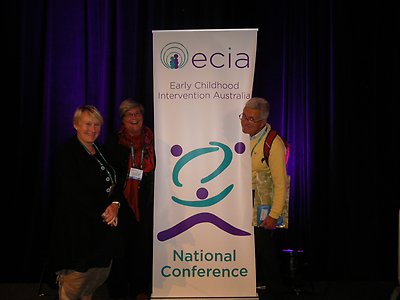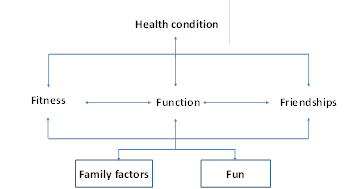CHILD-forskare i Australien
En grupp CHILD-forskare åkte under sensommaren till Australien på en konferens om små barn och tidig intervention. Margareta Adolfsson, forskare i handikappvetenskap, berättar här mer om resan.
A trip to the continent down under
In the end of the summer, I got the opportunity to combine business with pleasure and go to Perth, Western Australia, to visit doctoral student Marita Falkmer and professor Torbjörn Falkmer that work at Curtin University, to go on a bus tour along the coast up north and to visit vineyards in the famous wine district Margret River south of Perth.
 Förstora bilden
Förstora bildenEva Björck-Åkesson, Margareta Adolfsson and Mats Granlund
Pathways to Participation:
Engagement and Choice for Families and Children
In August 9-11, the Early Childhood Intervention Australia, ECIA, arranged their 10th Biennial National Conference together with the 1st Asia-Pacific Early Intervention Conference in Perth. The theme was Pathways to Participation: Engagement and Choice for Families and Children and the conference attracted around 500 participants, most of them from Australia or Asia but also from Europe, USA and Canada. CHILD-Professor Mats Granlund was invited as key note speaker, lecturing about Participation in family activities for children with profound disabilities. CHILD-Professor Eva Björck-Åkesson was invited to host a half day work shop focusing on ICF-CY as a common language in early childhood intervention. The work shop, which she conducted in cooperation with Mats and me, was attended by 30 interested persons. To demonstrate how the ICF-CY can be useful in clinical work we integrated the framework into a common problem solving process. In the conference program, CHILD was represented by two more presentations: Enhancing engagement and participation of children with profound multiple disabilities in family activities based on the research conducted by Jenny Wilder and Anna Karin Axelsson and ICF-CY based code sets focusing on participation for pre-schoolers presented by me. Another researcher closely related to CHILD, Ana Isabel Pinto from Porto, presented comprehensive research findings focusing on Social participation in Portuguese early childhood inclusive settings.
A key note speaker that impressed us were Peter Rosenbaum from Mc Master University in Canada talking about how we actually go beyond the F-Words in childhood disability. He introduced a populated version of the ICF-CY framework by using it as a scaffold onto which to hang ideas expressed in F-words (see figure). His intention was that the words should inform our thinking and our activities in all our work with young people with disabilities and their families. He said that child development is all about FUTURE, which is formed by the “Five F:s”. We should think early on transition to adulthood and always keep this horizon in view [see: Rosenbaum, P., & Gorter, J. W. (2012). The ‘F-words’ in childhood disability: I swear this is how we should think! Child: care, health and development, 38(4), 457-463]. Unfortunately, there are no Swedish F-words for these ideas.

The charismatic M’Lisa L Shelden from North Carolina talked about Coaching: An evidence-based strategy for promoting parent participation. She stated that coaching is not telling people what to do; it is giving them a chance to examine what they are doing in light of their intentions. Successful coaching is a mutual process that can be used to assist parents in recognising their strengths end developing intentional plans that support the growth and development of children as a part of everyday life.
We also had the opportunity to listen to the humurous Robin McWilliam, lecturing about Promoting engagement through a routines-based intervention approach. He defined engagement as “the time a child spends interacting with their environment (adults, peers, or materials) in a developmentally and contextually appropriate manner” [see McWilliam, R. A. (2010). Routines-based early intervention. Supporting young children and their families. Baltimore, MD: Paul Brookes], and stated that engagement includes participating, being busy, being absorbed, and doing “stuff”. Family resources available to promote engagement can be highlighted by making an “eco-map” that identifies informal and formal supports. As a way to evaluate our daily work, he recommended us: “Don´t judge each day by the harvest you collect but by the seeds you plant”. A valuable advice that can enable us to appreciate our efforts during the day.
It is more to say about the conference. However, you can go to http://www.eciaconference2012.com.au/main-pages/home.html. All presentations should be there – they are not yet, but hopefully they will come.
This was all about business. Do you want to know more about the pleasure, then I will be pleased to talk about it – for hours. I can only say, that Marita and Torbjörn Falkmer seemed to enjoy and feel that they had made the right decision moving to this great and friendly continent.
Margareta Adolfsson, PhD in disability research